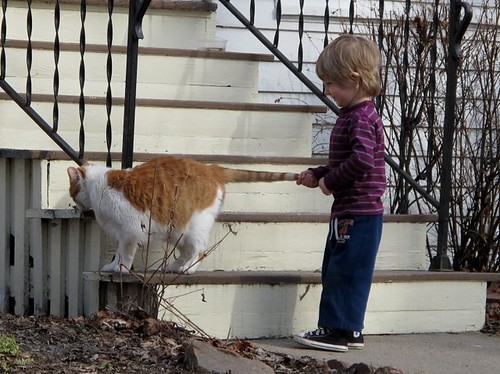I have mentioned before that sibling rivalry and jealousy are a normal part of child development. Indeed one could go even further and say that these feelings and the disruption they can cause in the family are an integral way by which the child resolves its primary narcissism.
Primary narcissism, as distinct from secondary narcissism, is the state of mind a child has from birth to 5 years of age. It perceives itself to be the centre of the universe, omnipotent and all valuable. The child believes it is more important than others, that it is special and that it should get favourable treatment.
This attitude is meant to decline as the child learns that it is not the centre of the universe and there are others on the planet that are of equal value and importance. Realising the importance of others reduces primary narcissism.

Most theorise that the narcissistic person has the life position of I’m OK, You’re not OK (I+U-). As a result they behave in a way where they view their own needs and self as more important than others. Others are therefore treated as being of less worth and value.
I have questioned this else where. I propose that the narcissist has the life position of I’m OK, You’re irrelevant (I+U?). If this is the case, others are not viewed as second class or of less value, instead their worth and needs are not even considered in the first place. The person has such a focus on self that they never actually get around to thinking about the other. Or the other is only considered in a superficial way.
This makes sense from a child development point of view. The young child in a state of primary narcissism is very self focussed. When they are dealing with others their focus is on how does this effect me. They are not yet capable in any substantive way of seeing it from the others perspective, thus displaying empathy.
Due to this high degree of self focus it does not even consider the question of, Are others OK or not?

Me, me, me
How does the child learn that others are relevant and are of importance. This is where the child’s jealousy and disquiet achieves importance. It is one of those things in life that just does not feel good but you have to go through it any ways. Its like going to the dentist. Nobody likes going because it feels bad but you have to go anyway.
If left to its own a child will not naturally evolve out of its narcissism. The child will learn that others are relevant when it is imposed on them and children don’t like that. It does not feel good and it means their here and now needs do not get met.
There is one piece of cake left and the younger brother has it because he has not had any cake yet. The older sister has already eaten her piece but she wants the last piece as well. The parent intervenes and gives the last piece to the brother much to the loud protestations of the sister. The brother ‘relevance’ and worth is imposed onto the psyche of the sister in this instance by the parents intervention. When this happens the sister’s primary narcissism reduces a little bit more. This feels unpleasant to her so she protests with anger and crying.
Hence we have the developmental importance of sibling jealousy, rivalry and envy. The pain the child feels with the jealousy and rivalry is what she remembers and thus she understands a little bit more that her brother is relevant in her psyche. If she did not feel the pain of the jealousy the process would flounder and she would never learn about the relevance of others and remain in the state of primary narcissism. As I mentioned before if a child is left to its own devices it will not naturally evolve out of its narcissism.

This not only happens with siblings or peers but also in the child’s relationship with mother and father. As the child grows mother begins to express her own Child ego state needs to the daughter. More and more the girl learns that mummy has needs and at times her needs are second and mummy’s needs are first. Again this happens because the mother imposes it onto the daughter and as any parent will tell you there can be loud and long protest when this happens. The mother forces her own ‘relevance’ onto the child to which the child feels ‘pain’ and then can get angry and so forth. The child is forced to recognise that others do exist in the world and they impinge on what it wants at times.
With sibling rivalry and jealousy most parents fail to see the developmental importance of these feelings as I have just described. They tend to simply react to the disquiet being expressed in such a ways that it ceases as expeditiously as possible. Their usual goal is to circumvent the rivalry or have it quickly resolved by some means. They fail to see that the children are using it in an endeavour to move through the developmental stage of primary narcissism. Hence they impede the child’s psychological development in this way.

When asked I usually highlight three things to parents in how they can assist the child to use its feelings of jealousy and rivalry to master this developmental stage.
1. Allow the child to experience the jealousy and rivalry feelings. To be aware of and experientially understand the feeling and that this shows that others do exist in the world and are relevant. Obviously this is presented to the child in a way that it can comprehend for its age.
2. Adult information is given to the child about what is happening
3. Role plays are a great way for a child (and indeed and adult) to learn the skill of empathy which is also needed to master narcissism.
These are not meant to stop at age 5 years but I would suggest carrying these on all the way through childhood and adolescence. Indeed there can be considerable feelings of rivalry and jealousy in adolescence which is a fairly narcissistic stage any way.
Graffiti
Tony...
ReplyDeleteJealousy? Yep... still working on it.
Cheers... roses
What do you get Jealous about Roses?
ReplyDeleteTony
Is a narcissistic personality more prevalant with only children as they never get the same situations that would see them being being taken down a peg or two. I have only one child and I am so mindful of the whole ego status that can go with it.
ReplyDeleteThat is a very real possibility Linda,
ReplyDeleteAn only child can have such narcissistic qualities for the reason you cite
Tony
Lots of things... it happens in all sorts of conditions and stuff. Some times, when I remember to think about it, i'm so jealous of my sister because she died. Sometimes it just screams inside of me - so not fair!
ReplyDeleteSome times i'm so jealous of you because what you do seems so interesting to me - so annoying!
Sometimes I get so jealous of my Husband's place of work because he's there every single day and they get to hang out with him and stuff and I'm so alone.
But Tony... I also see my sisters family and share in our grief. There's also the fact that sometimes when you do what you love to do as a job, it becomes sour, and yucky feelings can happen. Also, I fully understand that people that work with my husband are in an intimate relationship with him which causes lots of people to be so cruel to him. It helps me to remember he has needs, and that its for me to be a comfort to and for him when he comes home.
But i get so jealous Tony. It's not all the time and it happens with all sorts of things. It just happens... that's all.
Just like everyone else I guess... roses
Thank you for being so candid Roses.
ReplyDeleteJealous of your sister for dying is an interesting one.
Regarding your last comment, I find there is a very big difference in jealous feelings like any other human emotion. Some people have it lots, some have it very little and some people have it in the middle.
Some people's jealous feelings are so strong it can lead to murder, the crime passionnel. Other have little feelings of jealousy.
There could a be a variety of causes of excessive feelings of jealousy. Some parents can actively encourage it and play one child off against the other. Some parents will have a favourite child and favour him/her in front of the less favourite child. This child can then can easily feel quite jealous and carry that through into adulthood.
Or finally according to this post a person who does not complete their developmental transition through the stage of primary narcissism may end up being a jealous adult as they are continually stuck in the developmental stage and thus the feelings assocaited with it.
Just like the habitual cigarette smoker who is stuck in the oral stage of development
Tony